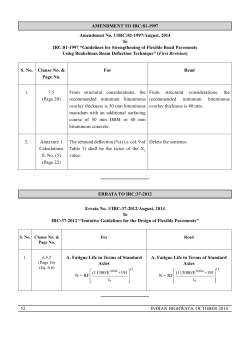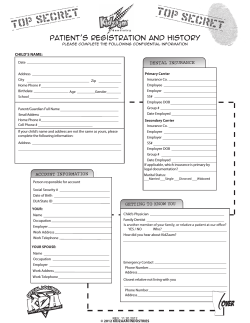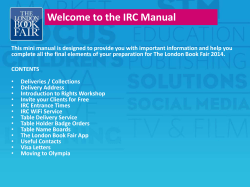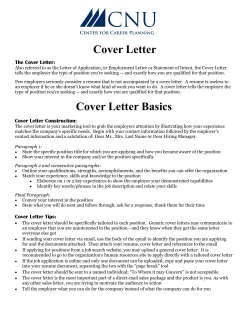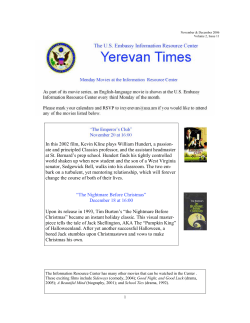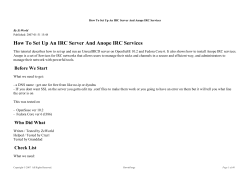
Employer-owned Life Insurance and Internal Revenue Code Section 101(j) Background Many business
Employer-owned Life Insurance and Internal Revenue Code Section 101(j) Many business owners and their professional advisor teams may be unaware that employerowned life insurance (EOLI), purchased or materially changed after Aug. 17, 2006, must meet specific exceptions and comply with the IRS “notice and consent” requirements. Failure to do so may result in the life insurance death benefit, less premiums paid, being subject to income tax. Background Businesses use life insurance for a number of reasons, including to: • Protect against the death of key employees; • Accumulate cash to fund future obligations under employee benefit plans; and • Fund buy-sell agreements. Life insurance owned by a business is commonly known as company-owned life insurance (COLI). Generally, life insurance is a unique asset in that the inside buildup of cash value is free of income tax, as is the death benefit. As a result, the business use of life insurance is an efficient approach to addressing future obligations. Creative CFOs realized it was possible for a company to generate positive cash flows from the policies it held for otherwise legitimate business purposes (i.e., key man insurance). Companies then began insuring the lives of not only key employees, but the lives of as many employees as possible. As a result, these arrangements are commonly referred to as “janitor insurance.” One particularly egregious arrangement involved Winn-Dixie Stores, Inc., which insured more than 30,000 employees in 1993. In cases like this one, the company would in effect realize a cash windfall on the death of the insured employee. In some cases, the insured was a former employee who had not been in the employ of the corporation for years or even decades. A number of these programs were effectively struck down by court cases wherein the court concluded the company did not have an insurable interest in the life of its lower-level employees. Congress acted in 2006 to discourage such arrangements by targeting the income taxfree nature of the life insurance death benefit. Now, contrary to the general rule that life insurance death benefits are received income tax-free, death benefits paid to employers are generally taxable to the extent they exceed the employer’s premium payments, unless certain requirements and exceptions are met for policies that were bought after Aug. 17, 2006, or that have significant changes made after that date. White Paper continues > Page 2 of 4 White Paper EOLI and Internal Revenue Code Section 101(j) PartnersFinancial What Are the Requirements of IRC §101(j)? Internal Revenue Code (IRC) Sections 101(j) and 6039I, enacted on Aug. 17, 2006, as part of the Pension Protection Act of 2006, include new rules with respect to the taxation of death benefit proceeds of an “employer-owned” life insurance policy. IRC §101(j) now subjects death benefits on EOLI policies to income taxation to the extent they exceed the employer’s basis in the policy, unless (1) a valid exception applies and (2) notice and consent requirements are satisfied. Valid Exceptions Valid exceptions include: • The insured is an employee at any time during the 12-month period before his or her death; or is, at the time the contract is issued, a director or a highly compensated employee; or • The death benefit is paid to a member of the insured person’s family, a beneficiary designated by the insured, a trust for a family member or designated beneficiary, or the insured’s estate; or the death benefit is used to buy an equity interest in the employer/business from a family member, a designated beneficiary, a trust for a family member or designated beneficiary or the insured’s estate. Notice and Consent Prior to the issuance of the policy, the employer must notify the employee/proposed insured of the following: that the employer intends to insure his life; the maximum amount for which he or she could be insured; and that the employer will be the beneficiary of the death proceeds. Thereafter, the employee must provide written consent to being insured. What Reporting and Recordkeeping Is Required? Under the new IRC §101(j) rules, if an employer owns life insurance contracts on employees, the employer is required to annually file Form 8925 with the employer’s annual return. In addition, the employer is required to maintain records that document compliance with IRC §101(j) and 6039I. Form 8925 requires the employer to provide the IRS the following information: • Number of its employees at the end of the tax year; • Number of such employees that are insured under EOLI contracts at the end of the tax year by policies issued after Aug. 17, 2006; • Total amount of insurance in force at the end of the tax year under such contracts; • Name, address and taxpayer identification number of the applicable policyholder and the applicable policyholder’s type of business; and • Whether the applicable policyholder obtained valid consent for each insured employee (or, if such consents are not obtained, the number of insured employees for whom such consent was not obtained). What Is the Penalty for Failure to Timely File Form 8925? The IRS has not issued definitive guidance on the penalty, if any, for the failure to timely file Form 8925. However, it appears the failure to file Form 8925 would likely result in a failure to file penalty of $50 for each instance of failing to comply with a “specified information reporting requirement.” (IRC §6723) How Does IRC §101(j) Apply to Common Situations? IRC §101(j) applies to all “employer-owned” policies issued after Aug. 17, 2006. IRC §101(j) applies to a variety of business planning and employee benefit arrangements, the more obvious of which include, without limitation, policies used for stock redemption, key-person, non-qualified deferred compensation, endorsement split-dollar and bank-owned life insurance. IRC §101(j) may also apply in other situations where the employer is not the policy applicant but may be considered the policy owner, such as collateral assignment split-dollar (economic benefit regime), or where a trust or other entity owns the policy for the benefit of the employer. IRC §101(j) (3) provides that the term “employer-owned life insurance contract” means a life insurance contract that (1) is owned by a person engaged in a trade or business, and under which such person (or a related person) is directly or indirectly a beneficiary under the contract, and (2) covers the life of an insured who is an employee of the applicable policyholder on the date the contract is issued. Page 3 of 4 White Paper EOLI and Internal Revenue Code Section 101(j) PartnersFinancial The term “applicable policyholder” with respect to an EOLI contract generally means the person who owns the contract. The term “applicable policyholder” also includes any person who bears a relationship specified in IRC §267(b) or §707(b) (1) to the owner of the contract, or who is engaged with the owner of the contract in trades or businesses that are under common control within the meaning of IRC §52(a) or (b). Buy-sell Arrangements • Redemptions. With a redemption arrangement, the owner of the policy is the employer. As a result, the policy is likely EOLI. • Cross-purchase – Corporations. In a corporate cross-purchase agreement, the shareholders, not the corporation, own the life insurance policy. As a result, it is likely that the policy is not EOLI. • Cross-purchase – Partnerships. In a partnership cross-purchase agreement, it is not clear whether the partner who owns the policy will be considered engaged in the trade or business of the partnership. As a result, it may be prudent to assume the policy is EOLI. Split-dollar • Endorsement Method Split-dollar (Economic Benefit Tax Regime). In a split-dollar arrangement where the employer is the named owner of the underlying life insurance policy and is a direct beneficiary of the policy, the arrangement fits squarely within the definition of EOLI. • Equity Collateral Assignment Method Split-dollar (Loan Tax Regime). In a split-dollar arrangement, subject to the loan tax regime, where the employee is the owner of the underlying life insurance policy, the policy is likely not EOLI. • Non-equity Collateral Assignment Method Split-dollar (Economic Benefit Tax Regime). In a non-equity collateral assignment split-dollar arrangement, subject to the economic benefit tax regime, where the employee is the owner of the underlying life insurance policy and is entitled only to current life insurance protection under the arrangement, the policy would not appear to be EOLI. However, due to the split-dollar life insurance regulations under IRC §61, the employer is deemed to own the underlying life insurance policy in such an arrangement. As a result, it may be prudent to assume the policy is EOLI. Section 162 Bonus Plans. In a typical Section 162 Bonus Plan, the employee is the owner of the policy and his or her designated beneficiary receives the entire death benefit. As a result, a 162 bonus plan is likely not EOLI. Qualified Plan Trusts and VEBA Plans. Any life insurance policy held by such a trust is likely not EOLI. Rabbi Trusts. Because an employer who establishes a Rabbi Trust is generally considered to own any assets held by the trust for income tax purposes, a life insurance policy held by a Rabbi Trust is likely EOLI. Nonqualified Deferred Compensation Plans. Because the employer owns the life insurance purchased to fund these plans, the policy is EOLI. Sole Proprietorship. A life insurance contract that is owned by a sole proprietor on his or her own life is not EOLI. Does IRC §101(j) Apply to a 1035 Exchange for a Contract Issued Before Aug. 18, 2006? IRC §101(j) applies to life insurance contracts issued after Aug. 17, 2006, except for a contract issued after that date pursuant to a IRC §1035 exchange for a contract issued on or before that date. For this purpose, any material increase in the death benefit of other material change causes the contract to be treated as a new contract and thus subject to IRC §101(j). A 1035 exchange without an increase in death benefit (or other material change) will not trigger the need for a new notice and consent. Page 4 of 4 White Paper EOLI and Internal Revenue Code Section 101(j) PartnersFinancial Generally, the following changes are not treated as material changes for purposes of determining whether an existing contract is treated as a new contract for purposes of IRC §101(j): a) Increases in death benefit that occur as a result of either the operation of IRC §7702 or the terms of the existing contract (provided the insurer’s consent to the increase is not required); b) Administrative changes; c) Changes from general account to separate account or from separate account to general account; or d) Changes as a result of the exercise of an option or right granted under the contract as originally issued. Can EOLI Non-compliance Be Corrected? Generally, failure to meet the notice and consent requirements under IRC §101(j) will result in the death benefit, less premiums paid, being subject to income tax. In Notice 2009-48, the IRS issued guidance that a failure to meet the notice and consent requirements can be corrected in certain limited situations. It should be noted that corrections cannot be made after the insured has died. Specifically, failure to meet the notice and consent requirements may be remedied if: a) The employer/policyholder made a good faith effort to satisfy those requirements, such as by maintaining a formal system for providing notice and securing consent from new employees; b) The failure to satisfy the requirements was inadvertent; and c) The failure to obtain the requisite notice and consent was discovered and corrected no later than the due date of the tax return for the taxable year of the employer/policyholder in which the EOLI contract was issued. In Notice 2009-48, Question 8, the IRS states the transfer of an existing policy from the employee/insured to the employer is sufficient to meet the notice and consent requirements. As a result, some commentators suggest one solution to remedy noncompliance is to first transfer the policy from the employer to the insured. Thereafter, the insured could transfer the policy to the employer. This material was created by NFP (National Financial Partners Corp.), its subsidiaries or affiliates for distribution by their registered representatives, investment advisor representatives and/or agents. This material was created to provide accurate and reliable information on the subjects covered but should not be regarded as a complete analysis of these subjects. It is not intended to provide specific legal, tax or other professional advice. The services of an appropriate professional should be sought regarding your individual situation. Neither NFP nor its subsidiaries or affiliates offer tax or legal advice. Guarantees subject to the claims paying ability of the issuing insurance company. For federal income tax purposes, life insurance death benefits generally pay income tax free to beneficiaries pursuant to IRC Sec. 101(a)(1). In certain situations, however, life insurance death benefits may be partially or wholly taxable. Situations include, but are not limited to: the transfer of a life insurance policy for valuable consideration unless the transfer qualifies for an exception under IRC Sec. 101(a)(2) (i.e. the “transfer-for-value rule”); arrangements that lack an insurable interest based on state law; and an employerowned policy unless the policy qualifies for an exception under IRC Sec. 101(j). Not all of the individuals using this material are registered to offer Securities products or investment advisory services through NFP Securities, Inc. Securities and Investment Advisory Services may be offered through NFP Securities, Inc., member FINRA/SIPC. NFP Securities, Inc. and PartnersFinancial are affiliated. Neither firm is affiliated with any other entity listed on this document. One Newton Place 275 Washington Street, Suite 205, Newton, MA 02458 67032 06/11 (INS-13857-11) Copyright © 2011 NFP. All rights reserved.
© Copyright 2025
